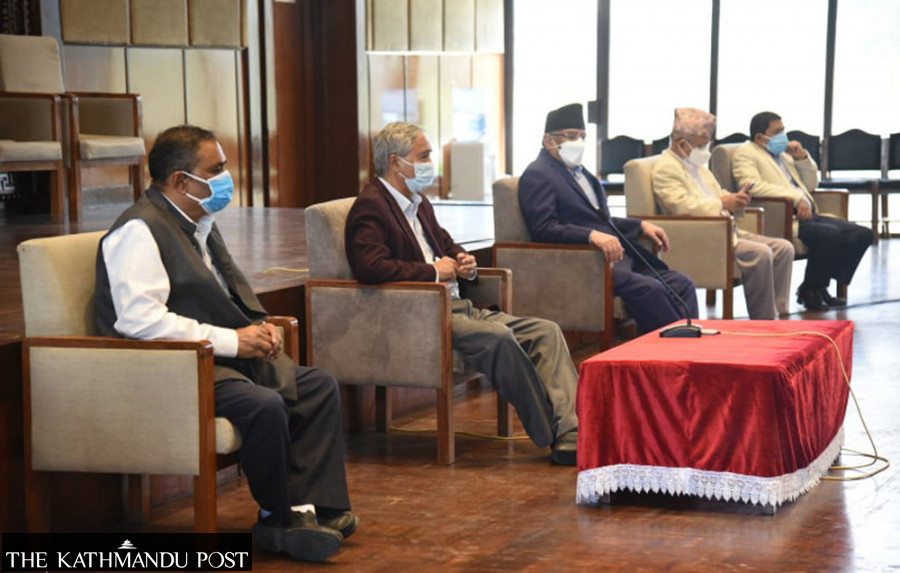Politics
Coalition’s future hangs in balance as elections declared amid MCC confusion
Leaders say too early to talk about electoral alliance but those opposing the US grant say any move to push it for ratification would lead to a breakdown of the coalition.
Anil Giri
Prime Minister Sher Bahadur Deuba, who was facing criticism for not announcing the date for local elections, on Monday decided to make a move. His government declared local polls for May 13, just as the Millennium Challenge Corporation, an American grant that has threatened the coalition, continues to be a hotly debated issue, with the United States already setting a February 28 deadline for its parliamentary ratification.
The date for the local polls was announced a day after a meeting between Prime Minister Deuba, chair of the main opposition CPN-UML KP Sharma Oli and Communist Party of Nepal (Maoist Centre) chief Pushpa Kamal Dahal on Sunday.
Secretariats of all the three leaders have maintained silence on what was discussed during Sunday’s meeting. Sources had told the Post on Sunday evening that the three leaders discussed a wide range of issues, including local polls and the US grant.
“The announcement of the date for local elections is a welcome step. A timely election will ensure that there will be no vacuum in the local bodies,” said Dev Gurung, chief whip of the Maoist Centre. “It, however, would have been better for the government if it had declared the local poll date after clearing the confusion over the constitutional provisions and elections laws.”
The Maoist Centre and the CPN (Unified Socialist), two key coalition partners in the Deuba government which are opposed to the parliamentary ratification of the MCC compact, had earlier called for early parliamentary elections by delaying the local elections, arguing that elections laws contradict the constitutional provisions.
The two parties had demanded amendments to the election laws to make them compatible with the constitution.
Now that the election date has been announced, questions have arisen as to how the coalition will move forward.
Deuba appears firm on moving the MCC compact in Parliament. He had been seeking the main opposition UML’s support for the same for quite a while. Now with the Americans setting a deadline, Deuba is under pressure.
In a response to a September 29, 2021 letter sent by Deuba and Dahal, MCC has responded that the time period of five months sought by them concludes on February 28 and that it is hoping for the compact ratification by then. Without ratification, the MCC board will have the authority to discontinue Nepal’s eligibility to receive the $500 million grant from the US, according to the letter sent by MCC.
The Maoist Centre still appears to be against the compact’s ratification and one of its leaders, who is also close to Dahal, told the Post on Sunday that the party would rather pull out of the current coalition if the government tabled the compact for endorsement.
Deuba wants to see the MCC compact ratified at the earliest, but not at the cost of the coalition. He fears a new left alliance between communist forces, which had defeated his Nepali Congress in the 2017 elections.
Deuba’s government partners refused to speak on the future of the coalition but hinted that the current alliance certainly faces disintegration risk.
“The announcement of the local poll date is a welcome move. We are ready for the elections,” Jagannath Khatiwada, spokesperson for the CPN (Unified Socialist). “But we are not going to make any compromise on MCC, as the compact ratification is not possible until there are amendments to some of its provisions.”
Khatiwada told the Post that no one should try to make the MCC compact a bargaining tool. “If the government tries to push the compact in Parliament, the alliance will break apart,” he said. “This alliance was not formed with an aim to ratify the MCC compact. Our party’s Central Committee meeting will decide on what to do with the MCC compact.”
Deuba was appointed prime minister on July 13 as per a Supreme Court order on July 12 last year.
He is backed by the Maoist Centre, the CPN (Unified Socialist), the Janata Samajbadi Party and the Rastriya Janamorcha.
A section of the Janata Samajbadi Party led by former prime minister Baburam Bhattarai has no objection with the MCC ratification. Besides the Maoist Centre and the CPN (Unified Socialist), the Rastriya Janamorcha too is against the MCC compat’s ratification.
When the the parties formed an alliance with Deuba’s Congress party, their aim was to continue it through the elections. But the MCC compact appears to have played a spoilsport.
If the ruling alliance manages to resolve its differences over the MCC compact’s ratification, the partners can continue the alliance through the polls, or else the coalition will break down, leaders say.
Even though Deuba is not averse to the idea of fighting elections under an electoral alliance with his coalition partners, some leaders in his Congress party, including Shekhar Koirala, say the party should go to polls on its own.
“We have not decided on any kind of poll alliance yet,” said Prakash Sharan Mahat, the newly appointed spokesperson of the Nepali Congress. “The local requirement will determine whether we will have an electoral alliance among the coalition partners for the upcoming polls.”
Gurung, the Maoist Centre chief whip, said even though the local election date has been announced, confusion continues to remain.
“So it’s too early to talk about a poll alliance,” he told the Post. “Since we believe in the constitution and rule of law, our position is that all legal and constitutional ambiguities should be resolved first. What if the decision to announce the poll date is challenged in the court of law?”




 13.12°C Kathmandu
13.12°C Kathmandu














